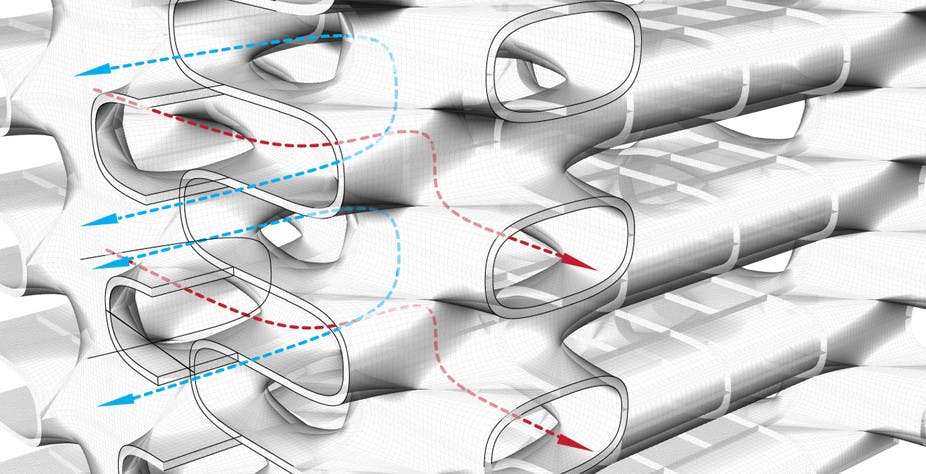Our environment is radically changing. Man-made objects constitute both a new space (the technosphere) and a new geological era (the Anthropocene).
Circulation flows are increasingly out of our control. Information, capital and waste are striking illustrations of this phenomenon. And yet we never talk about it.
This situation must be explained, counteracted, dealt with, and reshaped.
Complicity between elites, mafia, scientists and the public
Why do we never speak of our inability to control the circulation flows that we set in motion? The explanation probably lies in the extraordinary situation in which we find ourselves, where different stakeholders have their own reasons to avoid the topic of total, uncontrolled flows.
The ruling classes, those at the head of large organisations, both public and private, national, regional and multinational, cannot say that the situation is beyond their control, as this would constitute a public admission of their own powerlessness.
A large part of the profits of organised crime groups come from these flows, whether they are long or short-circuit flows, open or hidden, legal or illegal. But these groups, for obvious reasons, opt to stay silent on the subject, which they cannot fathom as a whole anyway.
The general public never wants to believe the worst. The idea that they could be overwhelmed by circumstances beyond their control, which they nevertheless contribute to through their everyday actions, is terrifying. They do not want hear about total, uncontrolled flows, preferring to listen to more reassuring voices telling them that everything is fine, even if it is a lie.
Scientists in the broadest sense (those in the hard sciences, the social sciences, the humanities, and in basic and applied research) are also responsible for this deafening silence. Dealing with uncontrolled phenomena is problematic, in so far as it is difficult to talk about what we cannot measure.
Total, uncontrolled flows: a new paradigm
We must counteract this general state of affairs with the realisation that human-made flows would be better understood if they were considered within an overall context of uncontrollability. The idea that anything can be controlled given enough effort would be replaced by a new paradigm, in which humans act in an overall environment that we cannot control.
This would not be a matter of shaping reality to a new concept, but rather giving people a better understanding of the inherent realities of the situation, allowing them to grasp the multiple facets of the fundamentally complex and protean phenomenon of total, uncontrolled flows.
In short, we must reconsider the basis for our current thinking on flows, especially information-, capital- and waste flows. Rather than basing our analysis on the illusion that total human control is possible, we would engage directly with the reality of the limits of our control.
How can we manage risks and crises?
This new approach could mean placing all man-made flows within the framework of risk management, and if necessary, crisis management.
For many of these flows, it could be argued that this is already the case. However, we must take this approach much further. We are not talking about the risk of an occasional accident in the transportation of waste, information or capital but, rather, using the framework of risk management (or in some cases crisis management) to understand total, uncontrolled flows.
From this starting point, many things can be considered. Does the risk management of total, uncontrolled flows belong to the public or private sphere? Should it be managed on an individual, collective, local, national, regional or international scale? This line of questioning brings to mind several significant propositions whose common characteristic is their overall failure, e.g. the carbon tax aimed at controlling CO2 emissions, the French “Collin and Colin” tax relating to the Internet, and – of course – the famous Tobin tax on financial transactions. These mechanisms use dissuasive or redistributive approaches. Wouldn’t these attempts at risk pooling be more effective and meaningful if they directly tackled the heart of the problem, that of total, uncontrolled flows?
Rebuilding our knowledge base
The analysis of total, uncontrolled flows is at the core of the IFITIS research project. Our aim is to investigate the ways in which different disciplines approach the phenomenon of flows. For this project, the main domain in question is the law. But our research is highly interdisciplinary and comparative.
The law has a highly specific approach to this question. It is based on jurisdictions, and movements of any kind may cross several different jurisdictions. While various areas of law have been created for this eventuality, they all have one of two characteristics: they are either highly specialized (transport law, free-trade law, the right to freedom of movement, private international law, international trade law, maritime law, space law, border law, etc.) and only partially cover flow phenomena; or broader (public law, private law, international law, European law, transnational law, etc.) but not designed to take into account the technosphere and the complex flows we are seeing today.
We must therefore reactivate all the legal resources at our disposal in order to understand these new flows. Crucial questions must be asked, such as how to deal with the phenomena of mass circulation (metadata, pools of capital, bulk waste), as a distinct entity, separate from individual flows (one piece of data, one unit of capital, one piece of waste), and whether – and how – flows change the legal status and jurisdiction of an object in movement.
We need answers to these questions. From a legal viewpoint, they will help us work toward the governance of total, uncontrolled flows.
Translated from the French by Alice Heathwood for Fast for Word.


